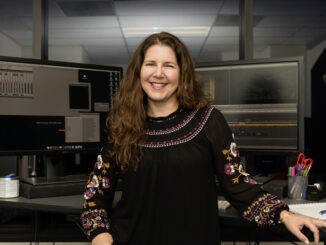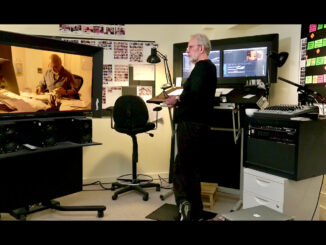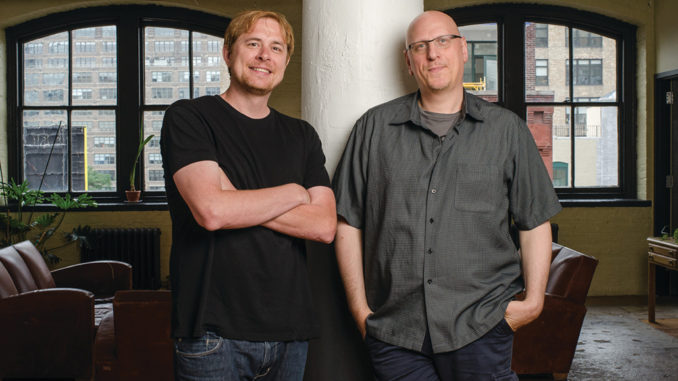
by Rob Feld • portraits by John Clifford
The skill set required for Alex Hall to edit a film like Oren Moverman’s Time Out of Mind— due in theatres September 11 through IFC Films — is vast and unique, not that there are many such films. A recurring mantra of their collaboration, since working together on The Messenger (2009), has been to “be bold”; that’s what works for them. The result is an immersive meditation in and around the mind of a mentally ill homeless man played by Richard Gere, as he whiles away his days on the streets of New York and tries to reclaim a piece of his identity.
How Hall came to cut for directors Moverman and Jim McKay, television writer/producer David Simon and, most recently, on episodes of both seasons of Nic Pizzolatto’s True Detective, charts a course of well-utilized coincidence and circumstance. Hall was part of the art-semiotics program at Brown University, which included some film studies, and moved to New York upon graduation. Cold-calling alumni, Hall found production assistant work on commercials until he was hired as the house PA at a production company, answering phones and taking lunch orders, but also putting together director’s reels to be sent out, working on Sony RM-450 decks.
It was the early 1990s and, after the company’s owner came across something called an Avid at a trade show and purchased it, Hall was tasked with setting up the system and figuring out how to use it. As the only one who knew how the machine worked, he immediately began cutting all the company’s commercials on the Avid. The next bit of happenstance came when he met filmmaker Jim McKay and co-edited his debut feature Girls Town (1996) with him. The film got into Sundance, won a bunch of awards, “And suddenly I was an editor,” Hall says.
More work with McKay and others followed, but Hall’s big break came while working next door to HBO’s The Wire’s editorial team. Relationships were formed, which led to an eventual job offer to cut the series’ fourth season. Hall came to love editing, although he had left school wanting to direct — and, in fact, has directed several TV episodes and is currently developing a feature.
“It was always part of the goal to have it be this one experiential thing. Normally you spend all your time trying to make scenes work visually and to have everything make sense. In this case, we weren’t concerned with that kind of logic.” – Oren Moverman
It is this mentality that has made him so valuable to Moverman and his collaborative style of working. “He thinks like a director,” says Moverman. “Every editor has his approach, but the thing I really admire about Alex — because his background is rich with everything from semiotics to art to rock ‘n’ roll — is that cutting True Detective or Treme is not going to dictate how he cuts a feature film. He’ll tap into what the script is about, what the shooting style is, what the director’s intentions are… And then he’ll make it his own.” Though Time Out of Mind’s long takes and abstracted presentation of time mean far fewer picture cuts than the average feature film, its editorial choices are as present and consequential as in any. That they work reveals a harmonious collaboration between Moverman and Hall, which only comes down to chemistry.
CineMontage spoke to the collaborators about their new film earlier this summer.
CineMontage: What makes you two good collaborators with each other?
Oren Moverman: I met Alex on The Messenger and we connected instantly over music. We spent a lot of time just talking about music, our lives, everything but the movie. We actually work very fast — so we can spend more time talking about other things. He’s such a pleasure to talk to and a great guy to hang out with, so we set up that environment in the editing room.
Alex Hall: I’ve been very lucky to work with amazingly smart and talented filmmakers who love to collaborate. There are no bosses; everybody is working together toward this common thing, and allowing for discoveries along the way. It makes it exciting. Oren takes that to a whole other level — seeking everyone’s input and incorporating it into in the work. He intentionally sets up situations that could completely fail or lead to some transcendent moment; he calls them “accidents,” but they’re not really.
There was a scene early on during theThe Messenger shoot. I was concerned by something in the dailies and wrote to him, “It feels like this is a mistake; maybe you want to reshoot it.” He just wrote back, “I love mistakes.” That’s actually a big part of Oren’s method, what gets him going, creating those moments where things could completely fall apart or some magical discovery could be made. Within the language of contemporary cinema, he wants to make something a little different; something challenging but with heart — not just an academic exercise. So within that, our relationship has always been one of pushing each other. Throw out the rules and preconceptions of what’s “right” or “good.” Be as bold as possible. Try things.
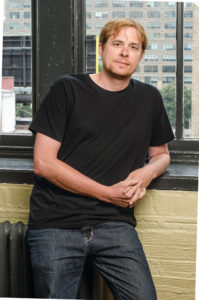
OM:Alex lays down the foundation. He shows you the possibilities already in the assembly. I like to be in the editing room, mostly because Alex makes it so much fun, but also because I like the process. It’s very collaborative. I don’t ever pretend to know what the right thing to do is. It’s always about finding it. We shoot in such a specific way; every shot is the entire scene. We never shoot in fragments or classical coverage. I react to the assembly, and come up with some ideas that are buried in the experience of shooting them. It sounds simple, but there are people who achieve a level of craft where it doesn’t become explainable. I think Alex is that guy now; he’s so instinctual and experienced that he can show you things without talking to you about what he’s doing technically.
AH: With Oren, we do a lot of talking beforehand. Everybody’s bringing ideas to the table during the writing stages and pre-production. I’m an editor, that’s my role — but I’ve never considered myself to be only that. It’s all filmmaking, all part of the telling of a story. I’ll assemble while he’s shooting and try to kick stuff to him that will stimulate him and get him excited. I can say, “We can really go this far with this,” or, “Conceptually, this is really interesting; maybe we should try more of it.” It’s a conversation from the very beginning and one that goes all the way through to the mix and color correction.
From the beginning,we discussed the editorial approach as being musical. We didn’t worry about act structures, coverage or scene structure. It was all about feel and the material suggesting its own rhythms.” – Alex Hall
CM: The decision not to cut can be the most important of all. With Time Out of Mind, a cut is huge because you could argue that any one shot could cut at any point; there’s a feeling of arbitrariness. But, of course, the decision isn’t arbitrary at all.
OM: Within the context of how the movie was shot, it gives you the feeling of an arbitrary life. And that’s the point.
It was always part of the goal to have it be this one experiential thing. Normally you spend all your time trying to make scenes work visually and to have everything make sense. In this case, we weren’t concerned with that kind of logic. We were trying to open it up and tell other stories besides the one the camera was seeing. That became almost like composing.
We always wanted to make the movie layer around Richard Gere’s character so as you see him, you have to make an effort to pay attention to him because it’s about the kind of man we don’t pay attention to.
CM: Alex, most of the projects you’ve worked on go for a level of verisimilitude. Is there something about that aesthetic that is particularly appealing to you?
AH: From the beginning, we discussed the editorial approach as being musical. We didn’t worry about act structures, coverage or scene structure. It was all about feel and the material suggesting its own rhythms. It was improvisational and jazzy in a lot of ways. Some shots would feel like they were dying; but then we would try some new sound thing, a new story being told off screen, and suddenly it would breathe new life into it, and we found we could stay longer. We were trying to create these immersive environments that the audience could lose themselves in — just as George, the main character, is lost in them. And we knew that sound was going to be just as important.
I am attracted to real stories about real people with real problems, without layered-on artificial drama or melodrama. This runs through almost everything I’ve done — from my work with Jim McKay[Everyday People, 2004; Our Song, 2000; Girls Town] to both of David Simon’s shows[Treme, 2010-13; The Wire, 2002-08] to the films that Oren and I have done together. It’s always about people and their cares and concerns. It’s about simply wanting to be a part of telling stories that I can believe. I guess that’s just old-fashioned humanism.
I’ve been lucky to have the opportunity to collaborate with talented people who are similar in their approaches and sensibilities; in what they’re interested in exploring and trying to say. Time Out of Mind is a perfect example of this because basically the film asks, “Whose stories do we choose to tell? Whose voices do we choose to hear? Who do we see and whom do we ignore? And why?”
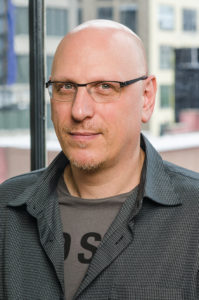
CM: What did you take with you from the David Simon experience? What was the spoken methodology for cutting The Wire?
AH: The most important lesson I learned with David came on the first episode I cut. Seith Mann directed it; he was fresh out of NYU, this young director they hired, as new to the show as I was. Seith composed this beautiful, low-angle, Dutch shot of two characters getting out of an Escalade. It was killer, like something out of a John Ford Western. And I used it, of course.
When I screened my cut for David, I was really nervous because it was my first time sitting with him. We get to that scene and he says, “Stop. What is that?” I said, “That cool shot of the foot comingout of the Escalade?” He said, “Yeah, what is that? Why is that in there?” I said, “Because it’s a cool shot, no?” He goes, “Yeah, it’s a cool shot — but we don’t do that. Let me tell you something: The Wire is about people being smaller than their circumstances, not bigger than them.”
That’s one of the main tenets of that show and informed all of the choices. The Wire was almost reportage, that on-the-ground, straightforward narrative style, so you weren’t supposed to do sweeping crane shots, low-angle things, or anything that would suggest self-conscious filmmaking. David had been a reporter for years and that’s how he approached filmmaking. There were rules but they weren’t arbitrary; they were organic to the material and themes of the show. It was a very rigorous approach.
Years later, when I started directing for David on Treme, he pointed to the camera and said, “Alex, you know what that is? That’s just a big pencil.”



